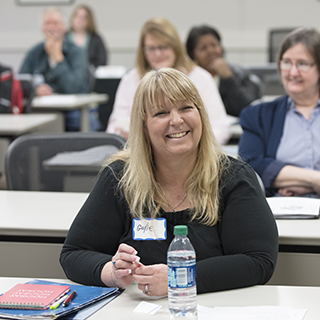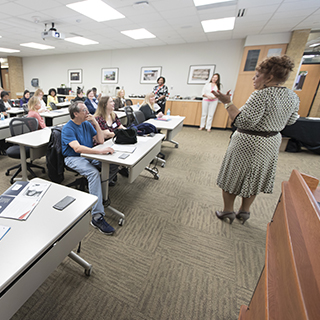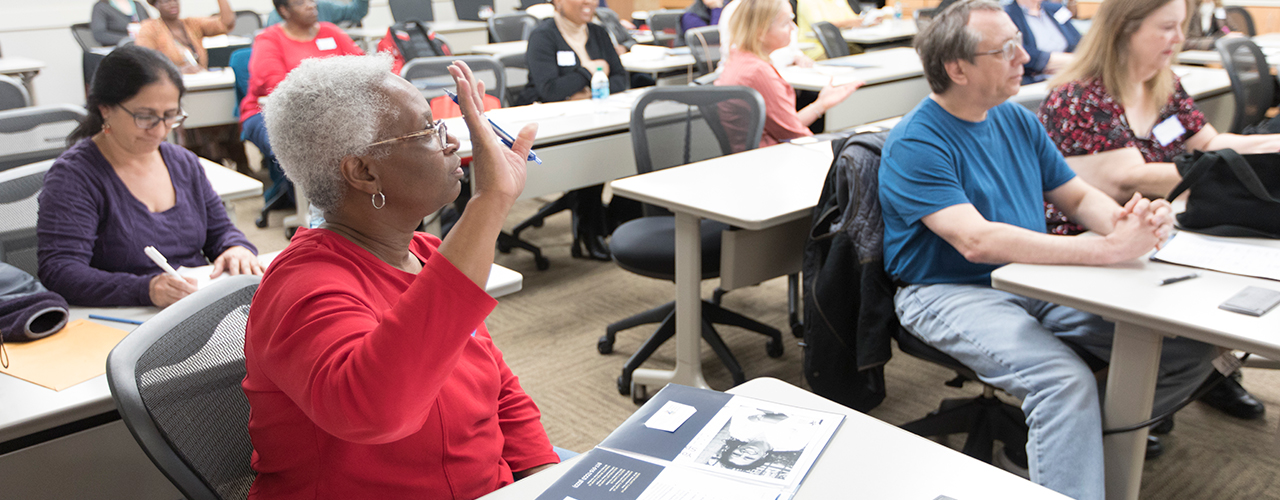It's Never Too Late
Helping Mature Workers Overcome Barriers to Finding Employment
More than 3 million workers who are 50 years of age and older (“50+”) are looking for full-time employment, according to the American Association of Retired Persons (AARP) Foundation website. The Great Recession, which lasted from December 2007 through June 2009, had far-reaching consequences, including leaving workers who are 50+ to face the largest overall increase in long-term unemployment, along with being the demographic group least likely to find work.
Based on data from the U.S. Bureau of Labor Statistics (BLS), mature workers (55 and older) comprised 8.9 percent of the unemployed population in the United States in 2014. Additionally, that same year, close to half a million adults aged 55 to 64 who wanted to work endured unemployment lasting 27 or more weeks.
With statistics like those, it is no surprise mature workers often stop looking for employment. According to the National Council of Aging’s website, mature workers stop looking for work because “they believe that none is available, employers will find them too old, they lack the necessary schooling/training or they face other types of discrimination.”
“The available talent pool continues to shrink, and for many employers, succession planning and retaining their intellectual capital has not been a priority. It is not even on the radar until that knowledge base is needed,” said LaToni Lacy, Society of Human Resource Management Foundation chair with the Mid-Cities Human Resource Association and human resource manager for Pollo Regio. “What companies must realize is people over 50 will be the largest talent pool by 2024 and should not be overlooked.”
AARP is seeking to bridge the gap between employers and mature job seekers. More than 460 employers, including Aetna, AT&T, Bank of America, Google, Harvard University, MD Anderson Cancer Center and Nestle, have signed a pledge with AARP stating that they:
- Believe in equal opportunity for all workers, regardless of age
- Believe that 50+ workers should have a level playing field in their ability to compete for and obtain jobs
- Recognize the value of experienced workers
- Recruit across diverse age groups and consider all applicants on an equal basis.
AARP also recognized 50+ jobseekers needed assistance to gain skills, find jobs and gain financial security. Enter the BACK TO WORK 50+ Program (BTW50+), which targets workers 50 years of age and older who were previously employed in working-class or moderate-income jobs and face barriers to employment (e.g. lack of education or computer skills). Partnering with existing community intermediaries, AARP is helping 50+ workers find new and better jobs. Mature workers can find information, training, support, work experience and employer access through this program.
 Tarrant County College is one of 20 sites nationwide offering BTW50+, which was established
through a grant from the AARP Foundation and the Walmart Foundation. “With a focus
on community outreach, enhancing student engagement and supporting student success
for older learners, the program has maintained a consistent and positive appeal to
the community members age 50 and older,” said Debra Sykes West, director of Community
& Industry Education Services at TCC NE. “We continue to receive a steady influx of
inquiries and prospective students in need of upgraded skills necessary to remain
competitive in the workforce, or to improve life skills such as online technology
tools and credentials required for employment.”
Tarrant County College is one of 20 sites nationwide offering BTW50+, which was established
through a grant from the AARP Foundation and the Walmart Foundation. “With a focus
on community outreach, enhancing student engagement and supporting student success
for older learners, the program has maintained a consistent and positive appeal to
the community members age 50 and older,” said Debra Sykes West, director of Community
& Industry Education Services at TCC NE. “We continue to receive a steady influx of
inquiries and prospective students in need of upgraded skills necessary to remain
competitive in the workforce, or to improve life skills such as online technology
tools and credentials required for employment.”
Classes available to program participants include an Employment Skills Workshop that targets the needs of 50+ jobseekers, such as conducting job searches online; writing cover letters, résumés and thank you notes; interviewing skills; and, navigating generational differences in the workplace. Additional workforce training programs retrain workers in high-demand occupations, including welding, CNC machine operation, call center agents and logistics.
Stacey Bryant, coordinator of special projects in TCC Corporate Solutions & Economic Development, works extensively with employers to ensure graduates leave training with high-demand skills and excellent employment prospects. “We worked with employers and hiring professionals to determine common qualities of successful candidates and what it takes to get noticed in the current job market,” said Bryant. Bryant also provides training information at events and mock interviews for participants.
Virginia Lowry, a program participant who went on to become an adjunct instructor at TCC, describes her experience with the BTW50+ program as “incredible.” After moving back to the DFW Metroplex, she decided to sign up for the program because of networking opportunities. Lowry found the introductory session “informative, motivational and inspiring.” She attended the “7 Smart Strategies for Jobseekers” forum, which gives participants insight into how employers look for candidates. She also participated in Power-Up sessions, which helped with building her skill set, coaching her for interviews, writing résumés and completing her LinkedIn profile.
“The AARP BTW50+ Team affiliated with TCC is a professional group of individuals,” said Lowry. “Each team member has a special skill set and willingly shared their experiences and insights with 50+.”
Daphne Brookins, who serves as a City of Fort Worth liaison between CAP Works and BTW50+, sees value in both programs working together to benefit job seekers.
AARP BACK TO WORK 50+ Program empowers and gives clients the tools and opportunities to go back into the work field and CAP Works provides tuition assistance for short-term certifications and job training, allowing low-income individuals in Tarrant County to improve their chances at employment, in order to become more financially independent and self-sufficient.
Daphne Brookins
“While clients are using services through AARP BACK TO WORK 50+ Program, we will provide wrap around support services for those who take advantage of these great opportunities,” Brookins said.
The program is important because “it assists the candidates in reinventing themselves for employment,” said BTW50+ coach Angela Spears. “We present information on how to fill out applications, how to get your application flagged and how to write a résumé for the 21st century. We also present information on how to use the computer and social media to help find employment, just to name a few.”
Jerry Hutyra, coordinator of workforce training in TCC Corporate Solutions & Economic Development, provides training and grant information on upcoming TCC Opportunity Center courses through AARP seminar, conferences and other events. “The AARP BACK TO WORK 50+ Program provides an avenue for my office to meet with honorably discharged military veterans to discuss training opportunities available with little or no cost to them,” he said. Current open enrollment allows registration for valuable skills training in targeted technical occupations for Tarrant County. “Veterans with marketable skills are highly sought after by companies in the DFW Metroplex,” said Hutyra.
Another way the BTW50+ program assists participants is by staying focused on the job market and what employers are seeking. “I constantly secret shop employment agencies and companies and attend job fairs to stay current on what agencies and employers are seeking,” said Janice Brown, BTW50+ employment coach. “Our comprehensive workshop is focused on the importance of being specific to ensure that candidates are aligning their skills with what the employer is seeking.”
 Kim Hunter, a graduate of the BTW50+ Program, sings Brown’s praises. “She was excellent
as a coach,” said Hunter. “She helped me prepare for my interviews.” Valuable indeed,
according to Hunter, who was laid off after working for Sprint for 18 years. She decided
to attend the program because after working for so long, she didn’t know how to interview.
“I had been putting in résumés without any results.”
Kim Hunter, a graduate of the BTW50+ Program, sings Brown’s praises. “She was excellent
as a coach,” said Hunter. “She helped me prepare for my interviews.” Valuable indeed,
according to Hunter, who was laid off after working for Sprint for 18 years. She decided
to attend the program because after working for so long, she didn’t know how to interview.
“I had been putting in résumés without any results.”
Hunter’s hard work with the program paid off. After graduating with an accounting technician certificate, she started as a finance and banking operations representative for a national financial institution in February.
“The 50+ demographic in Tarrant County, surrounding areas and nationally, continues to be one of the hard-to-place demographics in the employment arena,” said Sykes West. “We endeavor to eradicate this challenge by supporting and promoting the acquisition of ‘employment ready’ skills by our candidates who are already equipped with attributes such as being dependable, loyal, excellent communicators and committed to a positive work-ethic.”
According to Sykes West, inquiries about the program have been steady, averaging 50 per month, from individuals needing upgraded skills to remain competitive in the workforces or to simply improve their life skills and credentials for employment.
“Whether you are trying to re-enter the workforce after a lay-off, improve your skill set, make a career change or are a new job seeker, it will be worth your time to attend and participate in the AARP 50+ program,” said Lowry. “You will NEVER BE SORRY you attended an AARP 50+ event.”
So, what makes 50+ workers good hires? “The value of this age group can be measured by past performance,” said Lacy. “This demographic comes with a knowledge base of experience that is only achieved over time. They are skilled and have a dependable factor that is rare in the millennial talent pool.”
Kim Hunter agrees, saying, “Dedication, dependability and professionalism” set 50+ workers apart. Thanks to the BTW50+ Program, Hunter and others like her have the opportunity to prove it.
For information on the BTW50+ Program at TCC, contact Yolanda Hughes, Plus 50 coordinator, at 817-515-6150.


![//parameter[@name='author']](/magazine/assets/images/authors/kendra-prince.jpg)